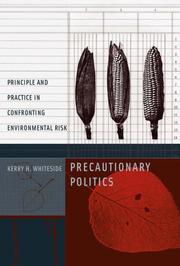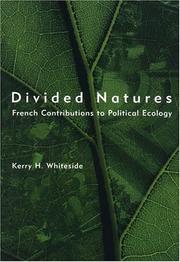| Listing 1 - 4 of 4 |
Sort by
|

ISBN: 9780262232555 9780262731799 0262232553 0262731797 Year: 2006 Publisher: Cambridge, Mass. : MIT Press,
Abstract | Keywords | Export | Availability | Bookmark
 Loading...
Loading...Choose an application
- Reference Manager
- EndNote
- RefWorks (Direct export to RefWorks)
Environmental risk assessment. --- Precautionary principle. --- Political participation. --- Environnement --- Principe de précaution --- Participation politique --- Evaluation du risque --- #SBIB:35H434 --- #SBIB:327.7H42 --- Voorzorgsprincipe --- 520 Milieubeleid --- 475 Landbouw --- Biotechnologie --- Beleidssectoren: milieubeleid en ruimtelijke ordening --- Specifieke internationale organisaties en samenwerking: milieu --- Principe de précaution --- Environmental risk assessment --- Political participation --- Precautionary principle --- Precautionary approach --- Citizen participation --- Community action --- Community involvement --- Community participation --- Involvement, Community --- Mass political behavior --- Participation, Citizen --- Participation, Community --- Participation, Political --- Political activity --- Political behavior --- Environmental law --- Political rights --- Social participation --- Political activists --- Politics, Practical --- Risk assessment
Book
ISBN: 1400859735 069160164X 0691022887 0691077819 9781400859733 9780691022888 Year: 2014 Publisher: Princeton, NJ
Abstract | Keywords | Export | Availability | Bookmark
 Loading...
Loading...Choose an application
- Reference Manager
- EndNote
- RefWorks (Direct export to RefWorks)
Drawing on previously unexplored sources, Kerry H. Whiteside presents the political theory of Maurice Merleau-Ponty (1908-1961), one of France's best-known twentieth-century philosophers. Whiteside argues that Merleau-Ponty's objective in his political writings was to make existentialism into the foundation for a philosophically consistent mode of political thinking. This study discusses the inadequacies Merleau-Ponty found in the traditional philosophies of empiricism and idealism, and then examines the subject-object dualism that he believed deprived previous forms of existentialism of political significance.Whiteside shows how Merleau-Ponty overcame these problems by grounding political reasoning in a theory of consciousness that emphasized both its individuality and its need for socially created meaning. After explaining Merleau-Ponty's modifications of the views of Sartre, Aron, and others, the book investigates how he applied his political theory in editorial exchanges with Communists and liberals. Throughout this study, Whiteside traces and criticizes the changes in the philosopher's concept of Marxism and points to his many ideas that bear on current controversies in political theory.Originally published in 1988.The Princeton Legacy Library uses the latest print-on-demand technology to again make available previously out-of-print books from the distinguished backlist of Princeton University Press. These editions preserve the original texts of these important books while presenting them in durable paperback and hardcover editions. The goal of the Princeton Legacy Library is to vastly increase access to the rich scholarly heritage found in the thousands of books published by Princeton University Press since its founding in 1905.
Political Science --- Law, Politics & Government --- Political Theory of the State --- -Views on political science --- Merleau-Ponty, Maurice, --- Political and social views. --- Merleau-Ponty, Maurice --- Political and social views --- Views on political science --- Merleau-Ponty, Maurice, - 1908-1961 - Political and social views --- Merleau-Ponty, Jean Jacques Maurice, --- Merlō-Ponty, Mōris, --- Ponty, Jean Jacques Maurice Merleau-, --- Ponty, Maurice Merleau-, --- מרלו־פונטי, מוריס, --- Merleau-Ponty, Maurice, - 1908-1961

ISBN: 0262286114 0585436630 0262250632 9780262286114 9780585436630 9780262250634 0262232219 9780262232210 0262731479 9780262731478 Year: 2002 Publisher: Cambridge, Mass. MIT Press
Abstract | Keywords | Export | Availability | Bookmark
 Loading...
Loading...Choose an application
- Reference Manager
- EndNote
- RefWorks (Direct export to RefWorks)
In this book Kerry Whiteside introduces the work of a range of French ecological theorists to an English-speaking audience. He shows how thinkers in France and in English-speaking countries have produced different strains of ecological thought and suggests that the work of French ecological theorists could lessen pervasive tensions in Anglophone ecology.Much of the theory written in English is shaped by the debate between anthropocentric ecologists, who contend that the value of our nonhuman surroundings derives from their role in fulfilling human interests, and ecocentric ecologists, who contend that the nonhuman world holds ultimate value in and of itself. This debate is almost nonexistent among French theorists, who tend to focus on the processes linking nature and human identity. Whiteside suggests that the insights of French theorists could help English-language theorists to extricate themselves from endless debates over the real center of nature's value.Among the French theorists discussed are Denis de Rougemont, Denis Duclos, Rene Dumont, Luc Ferry, Andre Gorz, Felix Guattari, Bruno Latour, Alain Lipietz, Edgar Morin, Serge Moscovici, and Michel Serres. The English-language theorists discussed include John Barry, Robyn Eckersley, Robert Goodin, Tim Hayward, Holmes Rolston III, and Paul Taylor.
Book
ISBN: 9782021022988 2021022986 Year: 2010 Publisher: Paris : la République des idées : Seuil,
Abstract | Keywords | Export | Availability | Bookmark
 Loading...
Loading...Choose an application
- Reference Manager
- EndNote
- RefWorks (Direct export to RefWorks)
Les dégradations que nous infligeons à la planète menacent l'avenir et la survie de l'humanité. Or l'urgence de la situation ne débouche pas sur des décisions fermes et concrètes. Jusqu'à quand ? Contrairement à ce que l'on pourrait croire, cet attentisme s'explique d'abord par une inaptitude politique : la démocratie représentative n'est pas en mesure de répondre aux problèmes écologiques contemporains. Ce livre propose des solutions, tant institutionnelles que délibératives, pour relever le défi et refonder notre sens du bien commun. Sauvegarder la biosphère exige de repenser la démocratie elle-même.
Environmental policy --- Human ecology --- Environmentalism --- Democracy --- Environmental protection --- Democracy and ecology --- Democracy and environmentalism --- Political ecology --- Political aspects --- Citizen participation --- Éthique de l'environnement. --- Politique de l'environnement. --- Administration publique --- Prise de décision. --- Environmental movement --- Social movements --- Anti-environmentalism --- Sustainable living --- Self-government --- Political science --- Equality --- Representative government and representation --- Republics --- Ecology --- Environment, Human --- Human beings --- Human environment --- Ecological engineering --- Human geography --- Nature --- Environment and state --- Environmental control --- Environmental management --- Environmental quality --- State and environment --- Environmental auditing --- Social aspects --- Effect of environment on --- Effect of human beings on --- Government policy --- Environmentalism - Political aspects --- Environmental protection - Citizen participation --- Environmental protection - Political aspects --- Prise de décision --- Éthique de l'environnement. --- Prise de décision
| Listing 1 - 4 of 4 |
Sort by
|

 Search
Search Feedback
Feedback About UniCat
About UniCat  Help
Help News
News